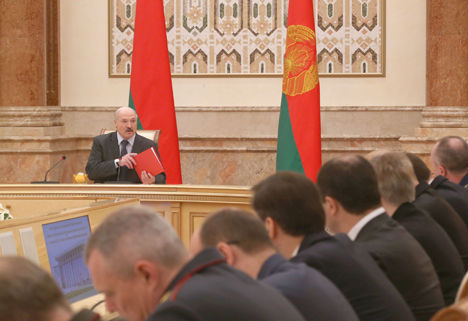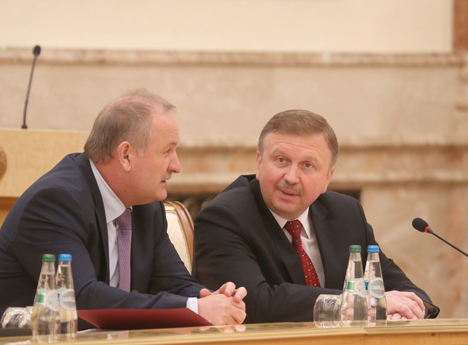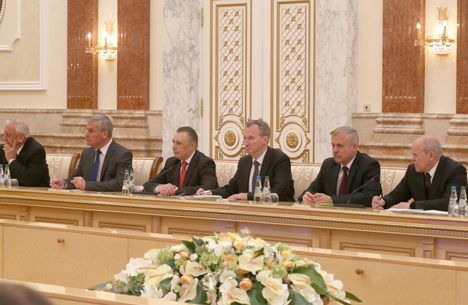Opinions & Interviews
Belarus Premier sees reserves for economic growth
 MINSK, 18 April (BelTA) – There are reserves for improving the economic situation in the country, Belarusian Prime Minister Andrei Kobyakov said after the meeting with the President to discuss the report by the Belarusian government, the National Bank, oblast executive committees and Minsk City Hall on the country’s development in Q1 2016 and measures to raise the efficiency of the economy, BelTA has learned.
MINSK, 18 April (BelTA) – There are reserves for improving the economic situation in the country, Belarusian Prime Minister Andrei Kobyakov said after the meeting with the President to discuss the report by the Belarusian government, the National Bank, oblast executive committees and Minsk City Hall on the country’s development in Q1 2016 and measures to raise the efficiency of the economy, BelTA has learned.
Andrei Kobyakov noted that many economic objectives were missed in Q1 2016. Still, there are reserves for economic growth. “In general, the results of the work in the first quarter cannot satisfy anyone, neither the head of state, nor the government. However, there are opportunities for improvement,” the Prime Minister stressed.
 Moreover, there has been a trend towards the economic recovery. “The results in March were quite different from those we had at the beginning of the year. In general, there are positive trends, and we have seen progress in certain aspects. First of all, in terms of GDP,” Andrei Kobyakov noted.
Moreover, there has been a trend towards the economic recovery. “The results in March were quite different from those we had at the beginning of the year. In general, there are positive trends, and we have seen progress in certain aspects. First of all, in terms of GDP,” Andrei Kobyakov noted.
“We have made positive steps in this direction. However, they are still fewer than we expected. Today the President criticized the government for the failure to make the full use of our reserves. Primarily, he expects better results with respect to the reduction of costs. In the current tough economic conditions the economic entities should streamline their operations and cut costs to remain competitive and work their normal schedule,” Andrei Kobyakov explained.
 In his words, the tasks are ambitious, but attainable. “It will be no good if we wait doing nothing, demanding cheap loans and budgetary subsidies,” the Prime Minister stressed. The government will further provide financial assistance only when this is reasonable. “The state will lend its shoulder if it is needed. However, in most cases there are enough inner resources,” Andrei Kobyakov added.
In his words, the tasks are ambitious, but attainable. “It will be no good if we wait doing nothing, demanding cheap loans and budgetary subsidies,” the Prime Minister stressed. The government will further provide financial assistance only when this is reasonable. “The state will lend its shoulder if it is needed. However, in most cases there are enough inner resources,” Andrei Kobyakov added.
The head of the government reminded the reporters about the fluctuations in the exchange rate of the Belarusian ruble in Q1 2016, and pointed out that the situation did not lead to a spike in the demand for foreign currency. “One of the most important achievements in terms of the de-dollarization is that we have started to pay less attention to the exchange rate of U.S. dollar, stopped using this currency to measure our failures and successes, and have focused on our own efforts,” Andrei Kobyakov said.







 print version
print version make home page
make home page add to bookmarks
add to bookmarks

